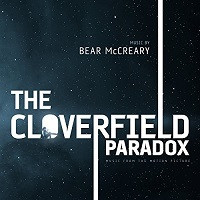- Composed by Bear McCreary
- Sparks and Shadows / 75m
The story of this film’s release ended up exciting a lot of people more than the film itself did. Retrofitted into the Cloverfield universe, The Cloverfield Paradox (originally called God Particle) was to be released theatrically by Paramount. Like the previous two entries in the series, details were released only very sparsely in the weeks ahead of the apparent release; then suddenly, on the night of the Superb Owl (an American tradition, I’m told) a trailer was shown on television – along with the news that the film was being released immediately on Netflix (who reportedly paid $50m for it). And released it was, to much fanfare but little acclaim.
The first Cloverfield didn’t have an original score – just an end credits piece, a great one, by Michael Giacchino, called “Roar!” – 10 Cloverfield Lane did have a score, by Bear McCreary, and it was excellent; it’s great to have him back for this one, doing more fine work – in fact it’s one of his most impressive to date.
The album’s Overture presents the score’s main theme, a great monster movie theme which is half-way “Roar!” and half-way Danny Elfman’s Planet of the Apes (coincidentally, I imagine, but it’s not the only Elfman sound in the score). The rousing B-section is only hinted at here. “Ava and Michael” presents the love theme, which is melodically related to the main theme (albeit only distantly); it’s warm and lovely, especially when the choir kicks in near the end.
The first of many action cues arrives in the shape of “Converging Overlord”, which is where the second hint of Elfman is heard, two different elements of his excellent main Spider-Man theme: the tight brass with that composer’s unmistakable sound, plus the swirling strings. The theme itself isn’t heard (the melody is an original McCreary) but the influence would appear to be there. “Drifting in the Dark” offers more urgency to the action – a series of variations on the main theme litter the lengthy, increasingly frantic track.
“In the Wall” then offers the score’s first overt horror music, and it’s very impressive stuff: chaotic brass and string writing, appropriately menacing and at times verging on oppressive, it’s great. The horror continues in “Mutant Space Worms”, with some dissonant ideas creeping in, some creative use of percussion to manufacture chills and some traditional horror movie musical devices (the pizzicato strings have been used this way in horror films for a long time and are no less effective now than they’ve ever been). Interesting instrumental textures also appear in “Jensen”, with what sounds like some sort of electric guitar offering an effective backdrop to the cue, with warm strings and winds appearing from the bleakness. In “Molly”, the creeps start coming thick and fast, but then things take a bit of a breather in “Cassiopeia”, an inoffensive if slightly inconsequential suspense track.
The action comes back in “Airlock 6”, thrilling choppy strings and brass; it’s a great little cue. “A Message for Ava” is completely different – long, drawn-out string lines tug at the heartstrings, the choir is back, it’s a truly beautiful piece. “Magno-Putty” sees the Elfman sounds come back big-time, and it races off really very nicely. An acute sense of drama – of time running out, perhaps – runs through “Spacewalk”, which features some terrific, surprisingly bright action material which should certainly be crowd-pleasing. “Launch Sequence” is the longest track in the score at a shade under nine minutes, and while it isn’t as focused as the best moments, it has a lot going on in it – some more frantic action, some suspense, some urgent drama.
There are two cues left, both of which are long and both of which are excellent. First is the beautiful, cathartic “A Stable Beam”, which has a certain ethereal quality to it which I find hard to resist; finally there’s the end credits suite, an extended summary of the main themes which is an absolute belter of a track, the album’s best. The Cloverfield Paradox is a really fine score: for my money the album’s longer than it needs to be but it’s not a significant issue: even at 76 minutes it’s very entertaining, it’s just that at 40 minutes it would be even better. Still, this is undoubtedly one of the best things Bear McCreary has done and it will undoubtedly become a real fan favourite.
Rating: ****
Also see:
10 Cloverfield Lane Bear McCreary
facebook.com/moviewave | twitter.com/MovieWaveDotNet | amazon.com













This sounds great, from what I’ve heard of it on some Youtube videos etc, but I’m waiting for the physical disc version which Bear has promised is coming.
Some of his Outlander season three album is brilliant, by the way. He’s still knocking out some great work.
Bear keeps getting better and better at writing for orchestras. Any chance of a review of Battlestar Galactica Seasons 3 and 4? It’s where Bear found his musical “voice” and still made percussion interesting without going the Remote Control route.
I underrated the BSG music so much when I reviewed the early ones. I really should revisit.
To be fair, the miniseries is still garbage.
I think they get better with each release, culminating with season 4’s excellence (especially for the finale score).
McCreary studied under and was assistant to Elmer Bernstein. It wasn’t like he was a band-member-turned-film-composer like Elfman or Zimmer.
James, you should really check out McCreary’s “The Cape” (LaLaLand Records). That is a seriously good superhero score for a short-lived TV series.
I think Human Target would be a much better review. I also think he’d like Dark Void. The game was trash, but the score was great combining some BSG elements with a real orchestra.